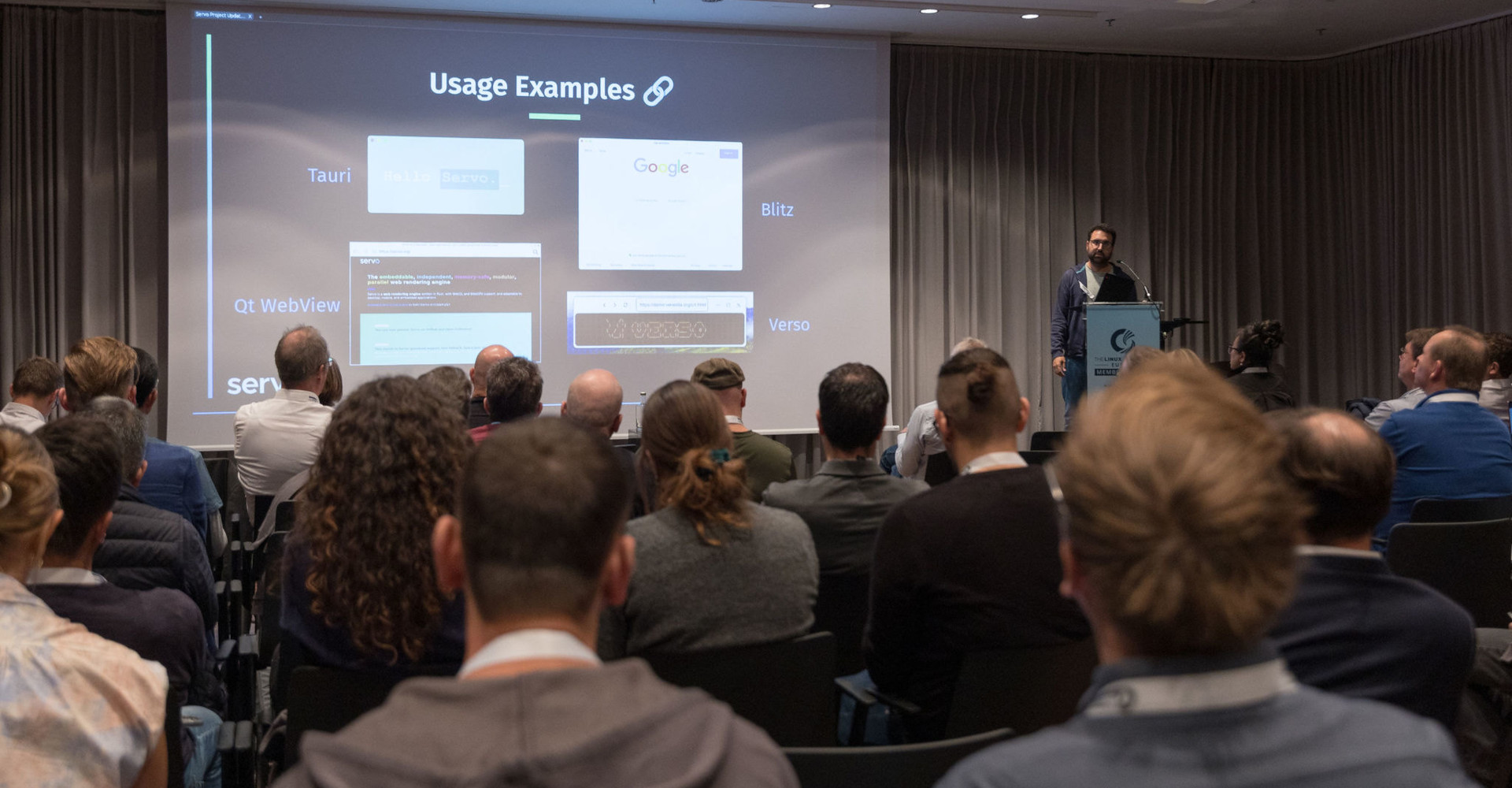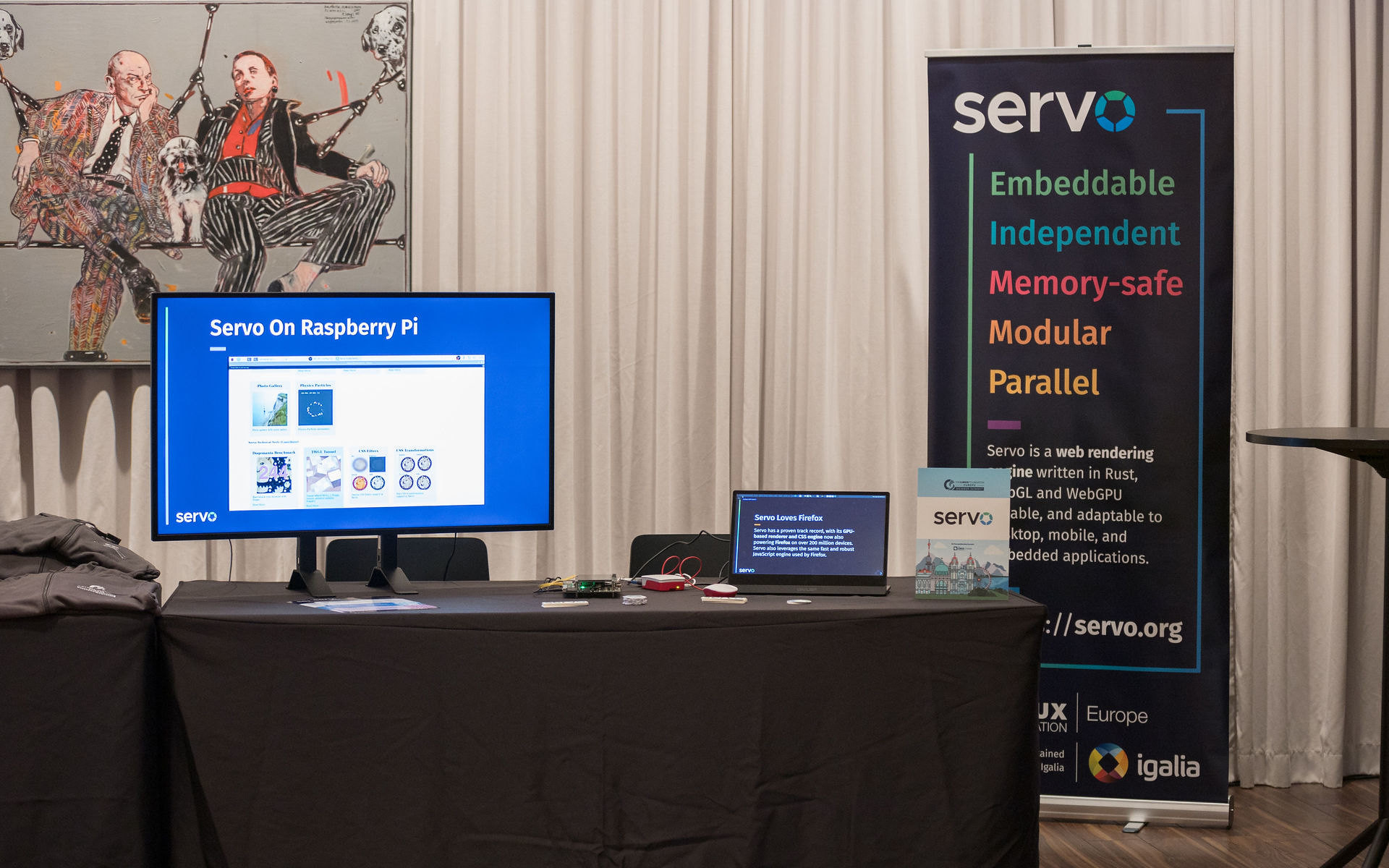 © Picture by Linux Foundation
© Picture by Linux Foundation
Servo Revival: 2023-2024
As many of you already know, Igalia took over the maintenance of the Servo project in January 2023. We’ve been working hard on bringing the project back to life again, and this blog post is a summary of our achievements so far.
Some history first #
You can skip this this section if you already know about the Servo project.
Servo is an experimental browser engine created by Mozilla in 2012. From the very beginning, it was developed alongside the Rust language, like a showcase for the new language that Mozilla was developing. Servo has always aimed to be a performant and secure web rendering engine, as those are also main characteristics of the Rust language.
Mozilla was the main force behind Servo’s development for many years, with some other companies like Samsung collaborating too. Some of Servo’s components, like Stylo and WebRender, were adopted and used in Firefox releases by 2017, and continue to be used there today.
In 2020, Mozilla laid off the whole Servo team, and the project moved to the Linux Foundation. Despite some initial interest in the project, by the end of 2020 there was barely any active work on the project, and 2021 and 2022 weren’t any better. At that point, many considered the Servo project to be abandoned.
2023: Igalia takes over maintenance of Servo #
Things changed in 2023, when Igalia got external funding to work on Servo and get the project moving again. We have previous experience working on Servo during the Mozilla years, and we also have a wide experience working on other web rendering engines.
To explore new markets and grow a stable community, the Servo project joined Linux Foundation Europe in September 2023, and is now one of the most active projects there. LF Europe is an umbrella organization that hosts the Servo project, and provides us with opportunities to showcase Servo at several events.
Over the last two years, Igalia has had a team of around five engineers working full-time on the Servo project. We’re taking care of the project maintenance, communication, community governance, and a large portion of development. We have also been looking for new partners and organizations that may be interested in the Servo project, and can devote resources or money towards moving it forward.

Achievements #
Two years is not a lot of time for a project like Servo, and we’re very proud of what we’ve achieved in this period. Some highlights, including work from Igalia and the wider Servo community:
- Maintenance: General project maintenance, tooling, documentation, community, and governance work. Lots of work has been put in upgrading Servo dependencies, specially the big ones (SpiderMonkey, Stylo and WebRender). There have been improvements in Servo’s CI and tooling. We now have a Servo book, the Servo community has been growing, and the Technical Steering Committee (TSC) is running periodic meetings every month.
- Communications: The project is alive again and we want the world to know it, so we’ve been doing monthly blog posts, weekly updates on social media, plus conference talks and booths at several events. The project is more popular than ever, and our GitHub stars haven’t stopped growing.
- Layout engine: Servo had two layout engines: its original one, and a newer one started around 2020, which follows specs more closely but was in very early stages. After some analysis, we decided to go with the new layout engine and start to implement features in it like floats, tables, flexbox, fonts, right-to-left, etc. We now pass 1.4 million subtests (1,401,889 at the time of publishing this blog post) in the Web Platform Tests. And of the tests we run today, our overall pass rate has gone from 40.8% in April 2023 to 62.0% (+21.2). 📈
- New platforms: Servo used to support Linux, macOS, and Windows. That’s still the case, but we’ve also added support for Android and OpenHarmony, helping us reach a wide range of mobile devices. 📱
- Embedded experiments: We’ve been working with the developers of Tauri, making Servo easier to embed and creating a first prototype of using Servo as web engine in WRY. Our community has also experimented with integrating Servo in other projects, including Blitz, Qt WebView, and Verso.
- Outreachy: Outreachy is an internship program for getting people from underrepresented groups into our industry via FOSS, and we’ve rejoined the program in 2024. Our intern in the May cohort, @eerii, brought DevTools support back to Servo.
Of course, it’s impossible to summarize all of the work that happened in so much time, with so many people working together to achieve these great results. Big thanks to everyone that has collaborated on the project! 🙏
Some numbers #
While it’s hard to list all of our achievements, we can take a look at some stats. Numbers are always tricky to draw conclusions from, but we’ve been taking a look at the number of PRs merged in Servo’s main repository since 2018, to understand how the project is faring.
| 2018 | 2019 | 2020 | 2021 | 2022 | 2023 | 2024 | |
|---|---|---|---|---|---|---|---|
| PRs | 1,188 | 986 | 669 | 118 | 65 | 776 | 1,771 |
| Contributors | 27.33 | 27.17 | 14.75 | 4.92 | 2.83 | 11.33 | 26.33 |
| Contributors ≥ 10 | 2.58 | 1.67 | 1.17 | 0.08 | 0.00 | 1.58 | 4.67 |
- PRs: total numbers of PRs merged. We’re now doing more than we were doing in 2018-2019.
- Contributors: average number of contributors per month. We’re getting very close to the numbers of 2018-2019, it looks like a good number.
- Contributors ≥ 10: average number of contributors that have merged more than 10 PRs per month. In this case we already have bigger numbers than in 2018-2019.
As a clarification, these numbers don’t include PRs from bots (dependabot and Servo WPT Sync).
Our participation in Outreachy has also made a marked difference. During each month-long contribution period, we get a huge influx of new people contributing to the project. This year, we participated in both the May and December cohorts, and the contribution periods are very visible in our March and October 2024 stats:
| Jan | Feb | Mar | Apr | May | Jun | Jul | Aug | Sep | Oct | Nov | Dec | |
|---|---|---|---|---|---|---|---|---|---|---|---|---|
| PRs | 103 | 97 | 255 | 111 | 71 | 96 | 103 | 188 | 167 | 249 | 170 | 161 |
| Contributors | 19 | 22 | 32 | 27 | 23 | 22 | 30 | 31 | 24 | 37 | 21 | 28 |
| Contributors ≥ 10 | 2 | 3 | 9 | 3 | 2 | 2 | 2 | 6 | 5 | 8 | 7 | 7 |
Anyway overall, we think these numbers ratify that the project is back to life, and the community is growing and engaging with the project. We’re very happy about them.
Donations #
Early this year we set up the Servo Open Collective and GitHub Sponsors, where many people and organizations have since been donating to the project. We decide how to spend this money transparently in the TSC, and so far we’ve used it to cover the project’s infrastructure costs, like self-hosted runners to speed up CI times.
We’re very grateful to everyone donating money to the project, so far adding up to over $24,500 from more than 500 donors. Thank you! 🙏

About the future #
Servo has a lot of potential. Several things make it a very special project:
- Independent: Servo is managed under Linux Foundation Europe with an open governance model, which we believe is very important for the open web ecosystem as a whole.
- Performant: Servo is the only web rendering engine that uses parallel layout for web content. Though Servo is not yet faster than other web engines that are already production-ready, we’re exploring new ways to render web content that take advantage of modern CPUs with many cores.
- Secure: Servo is written in Rust, which prevents many security vulnerabilities by design, such as memory safety bugs. Other kinds of unsoundness, such as concurrency bugs, are also easier to manage in Rust.
Of course, the project has some challenges too:
- Experimental: Servo is still in an experimental phase and is not a production-ready product. We still lack several features that are important for web content.
- Competition: The dominant web rendering engines have huge teams behind them, working on making them better, faster, and more complete. Catching up with them is a really complex task.
- Funding: This is a key topic for any open source project, and Servo is no different in this regard. We need organizations from public and private sectors to join efforts with us, and grow a healthy ecosystem around the project.
To finish on a positive note, we also have some key opportunities:
- Single web apps: Servo may excel at rendering specific web apps in embedded scenarios, where the HTML and CSS features are known in advance.
- UI frameworks: UI frameworks in the Rust ecosystem could start using Servo as web engine to render their contents.
- Web engine: Servo could become the default web engine for any Rust application.
- Web browser: In the future, we could grow into being able to develop a full-featured web browser.
The future of Servo, as with many other open source projects, is still uncertain. We’ll see how things go in the coming years, but we would love to see that the Servo project can keep growing.
Servo is a huge project. To keep it alive and making progress, we need continuous funding on a bigger scale than crowdfunding can generally accomplish. If you’re interested in contributing to the project or sponsoring the development of specific functionality, please contact us at join@servo.org or igalia.com/contact.
Let’s hope we can walk this path together and keep working on Servo for many years ahead. 🤞
PS: Special thanks to my colleague Delan Azabani for proofreading and copyediting this blog post. 🙏
- Previous: Short 2024-10-15
- Next: Solving Cross-root ARIA Issues in Shadow DOM